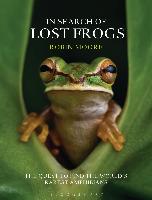On August 9, 2010, 33 teams from 21 countries were dispatched to search for the Lost Frogs identified by Conservation International. On their list were a host of species including, in the top ten most wanted, the Rio Pescado Stubfoot Toad, found only in Ecuador - which was to prove a triumphant rediscovery. Several months, a number of key rediscoveries - such as the Elegant Tropical Frog, last seen in 1937 and the Chalazodes Bubble-nest Frog - last seen in 1874 and two new species later, the Search for Lost Frogs had generated more than 650 news articles in 20 countries and over a billion potential viewers.
Author Robin Moore was responsible for spearheading the Search for Lost Frogs and coordinating the teams. He also co-led two expeditions to Colombia and Haiti. In Colombia in search of the Mesopotamia Beaked Toad, the steamy jungles of the Choco yielded not the desired species but a brand new one - the Mr. Burns Toad, so-called because of an uncanny resemblance to the Simpsons' character; the species was selected as one of Time magazine's top ten new species of 2010. In Haiti the team found six frogs last seen 20 years before, including the Ventriloqual Frog, named for its ability to throw its voice.
This fascinating new book tells the story of the expedition - its highs and lows, discoveries and failures and the campaign's ongoing work. Despite the campaign, one third of the world's amphibians remain threatened with extinction. Most of the species searched for were not found. But those that were provide a glimmer of hope. Understanding why these species have survived when many others have not should help us understand what makes these species different. In Search of Lost Frogs is a story of perseverance, disappointment, rediscovery, resilience, but ultimately of hope, written with passion and illustrated with the author's superb photographs.

